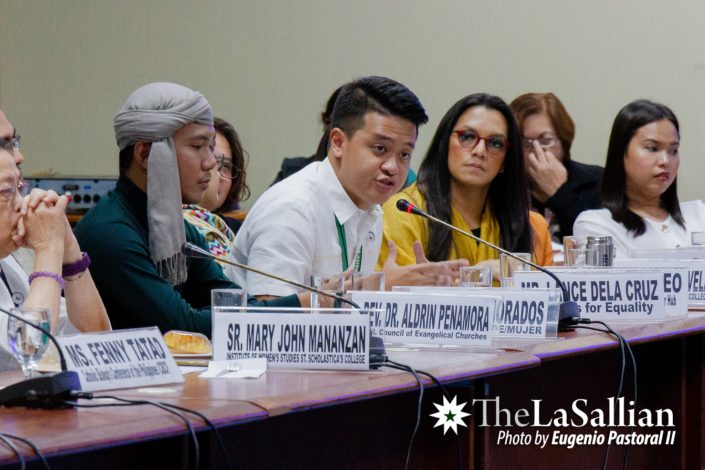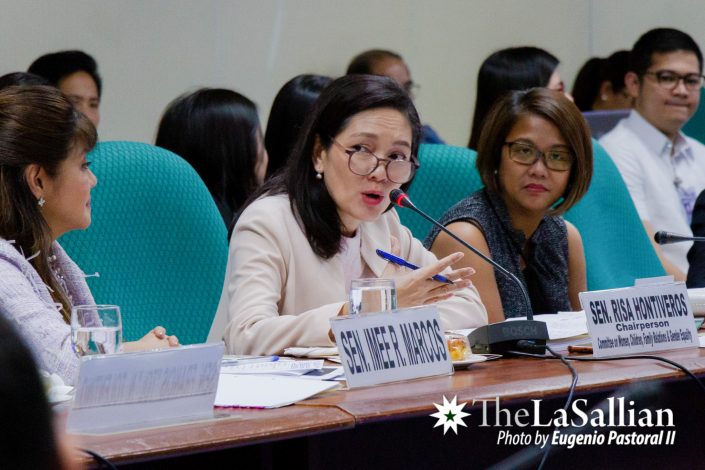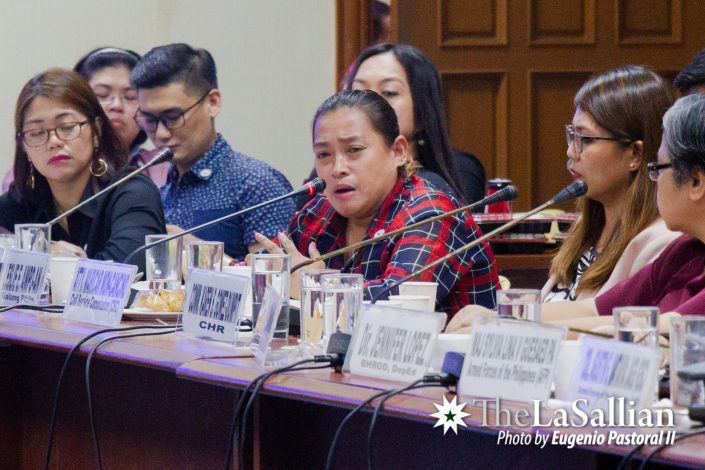The contents of the Sexual Orientation and Gender Identity Expression (SOGIE) Equality Bill was again discussed in a second hearing on September 4, about two weeks since the first hearing last August 22. Senator Risa Hontiveros, Chair of the Senate Committee on Women, Children, Family Relations, and Gender Equality, facilitated the discussion among representatives of the government, the academe, advocacy groups, and religious organizations, who each shared their own perspectives on the bill.
Apart from Hontiveros, fellow committee members Senators Nancy Binay and Imee Marcos were also present.

Contest between facts and feelings
Religious and pro-life groups took to the floor in opposition to the bill. The groups cited religious, physiological, and legal reasons as basis for their arguments.
Atty. Lyndon Caña, representative of the Coalition of Concerned Families of the Philippines, slammed the bill as subjective, citing that objective physiological facts would be defeated by “feelings” on gender.
He maintained that SOGIE is grounded in neither scientific nor biological fact, and warned of dangers raised by penalizing someone on the basis of disbelieving one’s sexual identity, in the face of harsh penalties outlined in the bill.
“The crime of discrimination is punished horrendously; half a million [pesos], six to twelve years [for] a person who will insist on fact versus a person who insists on a set of rights based on feelings?” Caña argued.
He also described the bill as “legally earth-shattering”, alleging that gender will become much more arbitrary and subject to change with the SOGIE Bill. Currently, the only way that a person can legally change their identity is by judicial order.
Resource speakers who claimed to be former LGBTQ+ also spoke against the bill. Film director Cesar Buendia spoke on behalf of a group claiming to be formerly LGBTQ+ individuals who were “redeemed by the grace and love of our Lord Jesus Christ”.

Despite experiencing “severe forms of discrimination” and “knowing the pain”, Buendia firmly stood against the SOGIE Bill saying that gender identity is a subjective perception or a product of one’s own mind. “Any law that guarantees rights to citizens based on mere perceptions, beliefs, and mindsets is dangerous,” he stressed.
Anthony Roquel, who was known for his role as Tonette Macho in Iskul Bukol, narrated that his “lifestyle” of homosexuality was “the worst part” of his life. He stressed that no one is born gay, but that there are other reasons behind it. Roquel himself asserted that his homosexuality stemmed from having an absentee father.
“When I accepted Jesus as my Lord and Savior, Jesus was the one who changed me [and] for 28 years living with freedom, with joy, and being a happy heterosexual man.”

Equality for all
Debating on the side of the SOGIE Bill were various LGBTQ+ organizations and individuals who argued on the basis of equal rights.
Members of the religious community also stepped up in support of the bill, most notably Sr. Mary John Mananzan of Saint Scholastica’s College. To express her support for the bill, Mananzan emphasized that the bill only sought equality for the LGBTQ+ community, adding, “The bill is not giving any special rights to this group, they are just saying that [the] rights of everybody should also be applied to them.”
University Student Government President Lance Dela Cruz, who represented Catholics for Equality in the hearing, was also present to give his stance in support of the bill. Dela Cruz mentioned that people who identify as straight are mere spectators to problems surrounding discrimination, “We’ve always just seen things, we have always been spectators to things deep inside within our Christian values we know are wrong and hateful. We have seen discrimination unfold in front of our own eyes and we did nothing. Tayo po ay nasa posisyon ng pribilehiyo.”
(We are in a position of privilege.)
Rhadem Morados, a member of the Muslim LGBTQ+ community, described discrimination experienced by the community such as forced marriages, conversion therapy, and forced military service. Even in receiving aid, he narrated, they were subject to prejudice, “LGBT are known to be breadwinners in Mindanao but when it comes to distribution of relief goods…the protocol of some government agencies [is] it should be composed of [a] mother and father.”
The bill, first filed in 2000 by the late Senator Miriam Defensor-Santiago and then Akbayan representative Etta Rosales, has now been re-filed in the 18th Congress, pending review.
